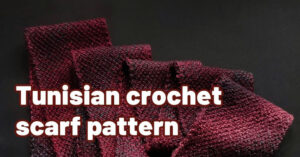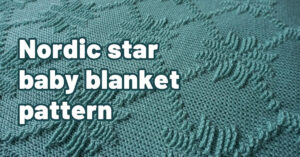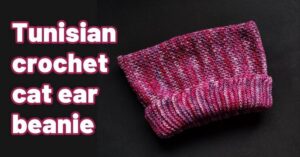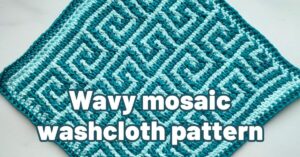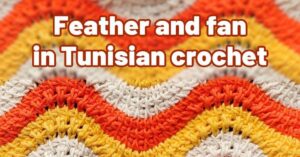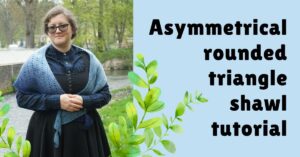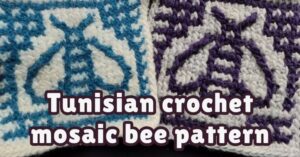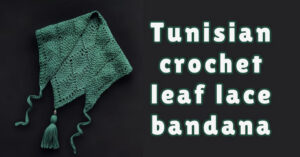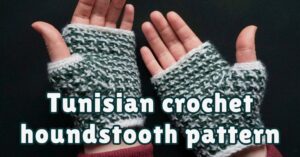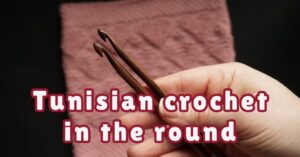Do you dream of making a woodland inspired nursery for your baby? Or do you have a loved one who’s about to have a baby and they like to decorate the baby room with useful items inspired by nature?
Maybe you are a lover of nature yourself and would like a nice lap blanket with beautiful leaf motifs made very easily in Tunisian crochet lace.
I designed the deep forest baby blanket with these uses in mind.
If you don’t know by now, Tunisian crochet lace works up much faster than knit lace, and it has extra stability due to the return pass chains, that keep things together much longer than the more fragile knit lace.
It also has smaller eyelets, which makes such a blanket warmer and cozier. If made for babies, it is recommended that this blanket is used for playtime only.
After experimenting a lot with laces inspired by knitting, I came up with this design that incorporates the elegant lace leaves and a non-curling honeycomb border.
I hope you give it a try!
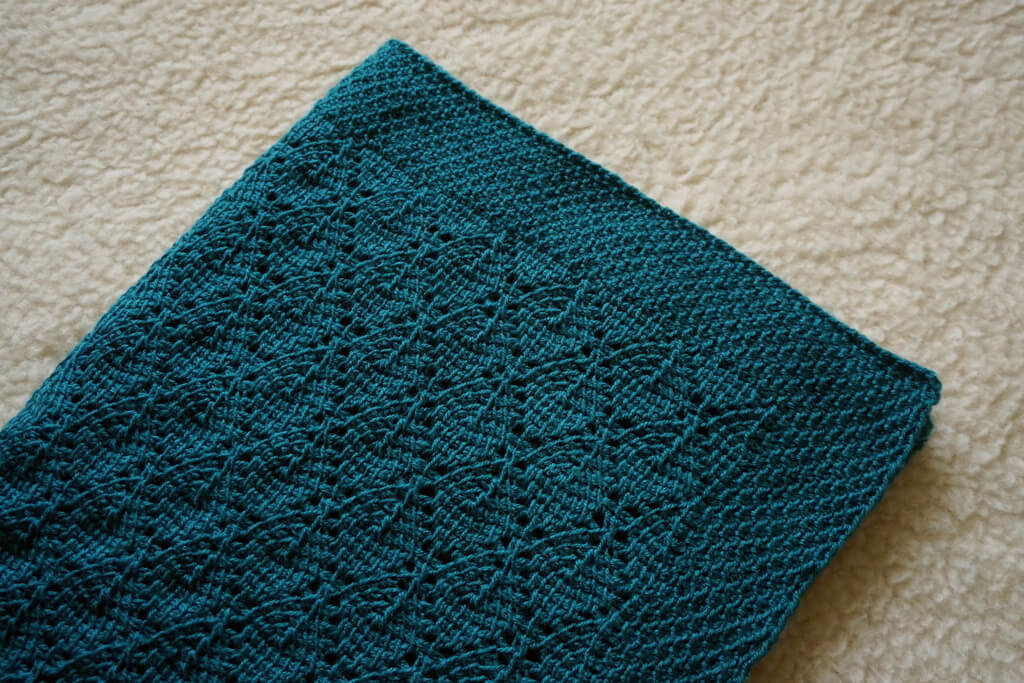
Inspired by the forest baby blanket pattern
This is an intermediate Tunisian crochet baby blanket pattern with lacy motifs that look like falling leaves in a lattice.
The forest theme can be intensified by the choice of yarn in a dark green, yellow or orange shade.
The pattern looks best in a single color or light speckled yarn, including heathered and tweed yarn.
The pattern includes a non-curling border all around, which is worked at the same time as the lacy inner section.
The lace motifs create a bubbly texture on the back of the work, which you can keep if you want to.
Alternatively, you can flatten it out by blocking the blanket.
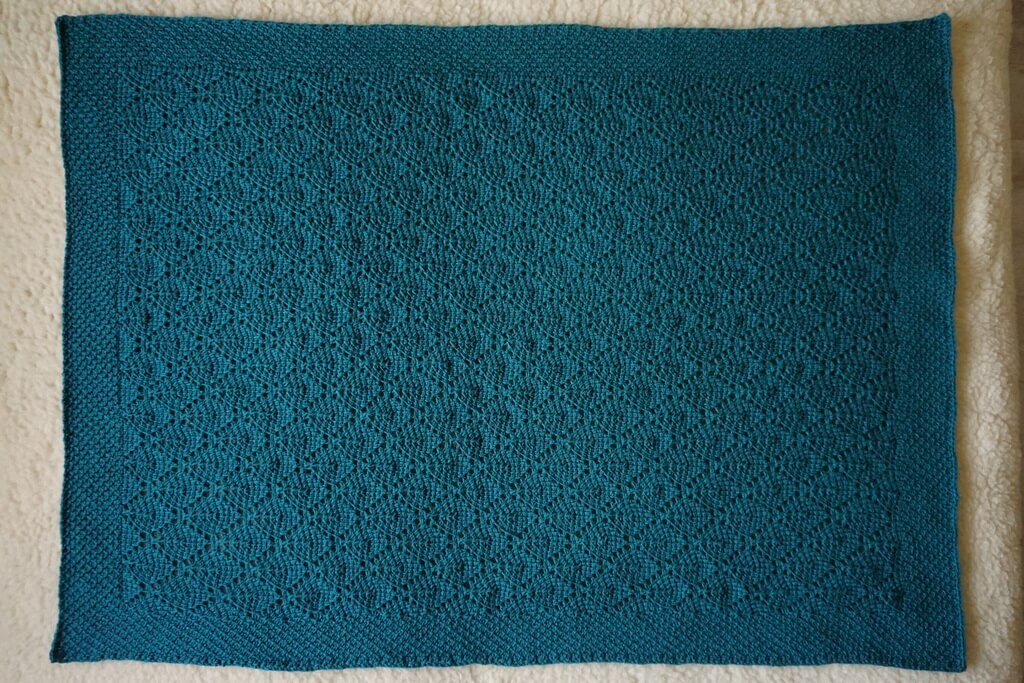
Size and measurements
When meeting gauge and working all rows in the pattern, the blanket measures 80 cm or 31.5″ across the top and 106 cm or 42″ in length.
For a wider blanket, add multiples of 10 stitches to the starting chain and increase the pattern repeat counts by 1.
For a longer blanket, make more pattern repeats.
Gauge
Gauge is not essential in this pattern, as you work to your desired measurements.
If you want to work to the provided size, make a gauge swatch by following these instructions.
Row 1. Ch 25, pick up 25 loops in the back bumps of the chains, R (26 loops)
Row 2. 24 Tss, Ls, R (26 loops)
Repeat Row 2 another 24 times for a total of 26 rows.
Block the swatch by washing it and laying it flat to dry.
Measure a 10 by 10 cm (4″ by 4″) square in the middle of the swatch and count the stitches and rows.
17 stitches and 17 rows should measure 10 by 10 cm (4″ by 4″).
If you get fewer stitches and rows, go down a hook size (0.5 mm), if available, and make another swatch.
If you get more stitches and rows, go up a hook size (0.5 mm), if available, and make another swatch.
Repeat the swatching process until you reach the recommended gauge. Make a note of the hook size used.
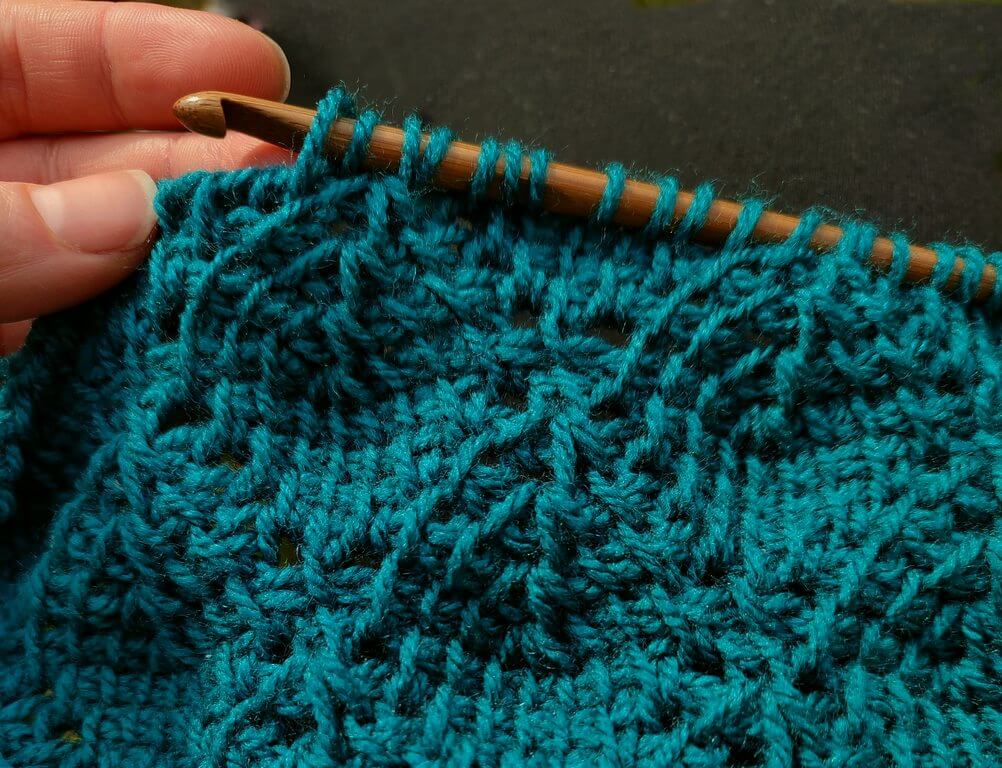
Skill level
Intermediate – you will work with eyelets, increases, decreases, repeats of one simple lace pattern. Adjusting the width and height of the pattern is also an option if you are experienced.
Notions
- Yarn: 300 g or 720 meters of size 3 baby acrylic yarn at about 240-250 meters per 100 grams;
- Hook: Tunisian crochet hook with cable or straight, 5 mm or hook size that gets you gauge;
- Tapestry needle, scissors, tape measure;
- Stitch markers;
- Tools for blocking (iron with steam or other steamer), blocking mats and pins.
Sample made in Alize Șekerim yarn, 100% acrylic, with 320 meters per 100 g, color 212.
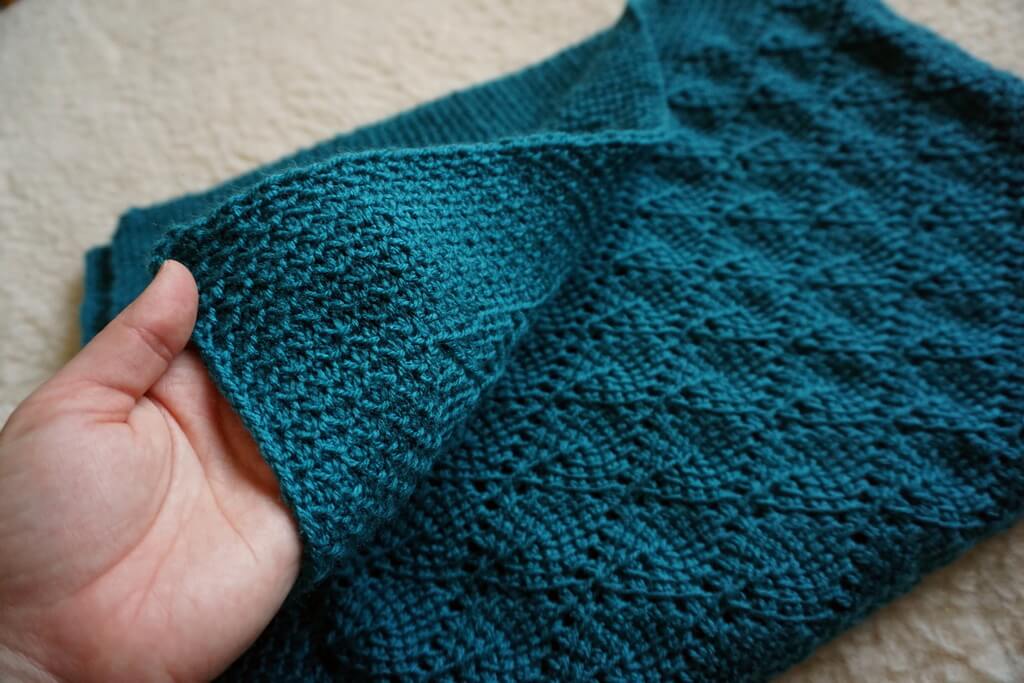
Observations
This is a Tunisian crochet pattern worked flat. You always work on the right side of the fabric.
Pattern repeats are highlighted in bold text. Add more repeats if wanting to increase the width.
When you encounter an eyelet and need to make a Tss, insert the hook through the eyelet and draw up a loop.
After a YO, you don’t skip a stitch.
Stitch makers are useful for keeping track of pattern repeats.
Repeats are shown in [square brackets].
At the end of the first row, loop counts are shown, including the first and last loop, before starting the return pass.
The loop counts are the same for all rows.
Each row of symbols in the chart is independent of the previous row.
You read each row of the chart as if reading a row of instructions.
The chart includes special symbols that are not usual for Tunisian crochet, but are explained in the legend and the instructions accompanying the chart.
Abbreviations
- BO – Bind off;
- Ch – Chain;
- Ls – Last stitch: insert hook behind the two vertical bars at the end of the row, YO and pull up a loop;
- R – Regular return pass: Ch 1, Rep [YO and pull through 2 loops on hook] until 1 loop is left;
- Rep – Repeat;
- Sk – Skip;
- Sl St(s) – Slip stitch(es);
- St(s) – Stitch(es);
- Tps – Tunisian purl stitch: YU, insert the hook under the vertical bar of the next St, YO and pull up a loop;
- Tss – Tunisian simple stitch: insert the hook under the vertical bar of the next St, YO and pull up a loop;
- Tss2Tog – Tunisian simple stitch 2 together: insert the hook under the front vertical bars of the next 2 Sts, YO and pull up a loop;
- Tss3Tog – Tunisian simple stitch 3 together: insert the hook under the front vertical bars of the next 3 Sts, YO and pull up a loop;
- YO – Yarn over;
- YU – Yarn under: bring the yarn under and to the front of the hook.
Video tutorial for the leaf lace motif
This tutorial only comes with a right handed version for now, but if you are OK with seeing the text mirrored, let me know and I’ll export a left handed version for you and embed it below.
Instructions
Start with a slip knot on the Tunisian crochet hook.
Bottom honeycomb edge
Row 1. Ch 154, pick up 154 loops in the back bumps of the chains, R — 155 loops
Row 2. Rep [Tss, Tps] 76 times, Tss, Ls, R
Row 3. Rep [Tps, Tss] 76 times, Tps, Ls, R
Rows 4-11. Repeat Rows 2-3 another 4 times.
Lace pattern
Row 12. Rep [Tss, Tps] 5 times, 11 Tss, Rep [10 Tss] 11 times, 12 Tss, Rep [Tps, Tss] 5 times, Ls, R
Row 13. Rep [Tps, Tss] 6 times, YO, 3 Tss, Tss3Tog, 3 Tss, YO, Rep [Tss, YO, 3 Tss, Tss3Tog, 3 Tss, YO] 11 times, Tss, YO, 3 Tss, Tss3Tog, 3 Tss, YO, Rep [Tss, Tps] 6 times, Ls, R
Row 14. Rep [Tss, Tps] 5 times, 3 Tss, YO, 2 Tss, Tss3Tog, 2 Tss, YO, Tss, Rep [2 Tss, YO, 2 Tss, Tss3Tog, 2 Tss, YO, Tss] 11 times, 2 Tss, YO, 2 Tss, Tss3Tog, 2 Tss, YO, 3 Tss, Rep [Tps, Tss] 5 times, Ls, R
Row 15. Rep [Tps, Tss] 5 times, Tps, 3 Tss, YO, Tss, Tss3Tog, Tss, YO, 2 Tss, Rep [3 Tss, YO, Tss, Tss3Tog, Tss, YO, 2 Tss] 11 times, 3 Tss, YO, Tss, Tss3Tog, Tss, YO, 3 Tss, Rep [Tps, Tss] 5 times, Tps, Ls, R
Row 16. Rep [Tss, Tps] 5 times, 5 Tss, YO, Tss3Tog, YO, 3 Tss, Rep [4 Tss, YO, Tss3Tog, YO, 3 Tss] 11 times, 4 Tss, YO, Tss3Tog, YO, 5 Tss, Rep [Tps, Tss] 5 times, Ls, R
Row 17. Rep [Tps, Tss] 5 times, Tps, 10 Tss, Rep [10 Tss] 11 times, 11 Tss, Rep [Tps, Tss] 5 times, Tps, Ls, R
Row 18. Rep [Tss, Tps] 5 times, Tss, Tss2Tog, 3 Tss, YO, Tss, YO, 3 Tss, Rep [Tss3Tog, 3 Tss, YO, Tss, YO, 3 Tss] 11 times, Tss3Tog, 3 Tss, YO, Tss, YO, 3 Tss, Tss2Tog, Rep [Tss, Tps] 5 times, Tss, Ls, R
Row 19. Rep [Tps, Tss] 5 times, Tps, Tss2Tog, 2 Tss, YO, 3 Tss, YO, 2 Tss, Rep [Tss3Tog, 2 Tss, YO, 3 Tss, YO, 2 Tss] 11 times, Tss3Tog, 2 Tss, YO, 3 Tss, YO, 2 Tss, Tss2Tog, Rep [Tps, Tss] 5 times, Tps, Ls, R
Row 20. Rep [Tss, Tps] 5 times, Tss, Tss2Tog, Tss, YO, 5 Tss, YO, Tss, Rep [Tss3Tog, Tss, YO, 5 Tss, YO, Tss] 11 times, Tss3Tog, Tss, YO, 5 Tss, YO, Tss, Tss2Tog, Rep [Tss, Tps] 5 times, Tss, Ls, R
Row 21. Rep [Tps, Tss] 5 times, Tps, Tss2Tog, YO, 7 Tss, YO, Rep [Tss3Tog, YO, 7 Tss, YO] 11 times, Tss3Tog, YO, 7 Tss, YO, Tss2Tog, Rep [Tps, Tss] 5 times, Tps, Ls, R
Rows 22-151. Repeat Rows 12-21 another 13 times.
For a longer blanket, repeat Rows 12-21 more times.
Top honeycomb edge
Row 1. Rep [Tss, Tps] 76 times, Tss, Ls, R
Row 2. Rep [Tps, Tss] 76 times, Tps, Ls, R
Rows 3-11. Repeat Rows 1-2 another 5 times.
Bind off in pattern, using slip stitches.
Weave in the ends and block the blanket in a rectangular shape, opening up the lace.
Chart for this forest-inspired baby blanket pattern
The chart is available in the PDF version of the pattern.
Final remarks
I hope you enjoyed this deep forest themed baby blanket pattern in Tunisian crochet lace and that you will try out more lace patterns for other blankets in the future.
If you liked the lacy motifs that can be repeated more times for a bigger blanket, you might also like the Beryl lace blanket square pattern, which is also free on the blog.
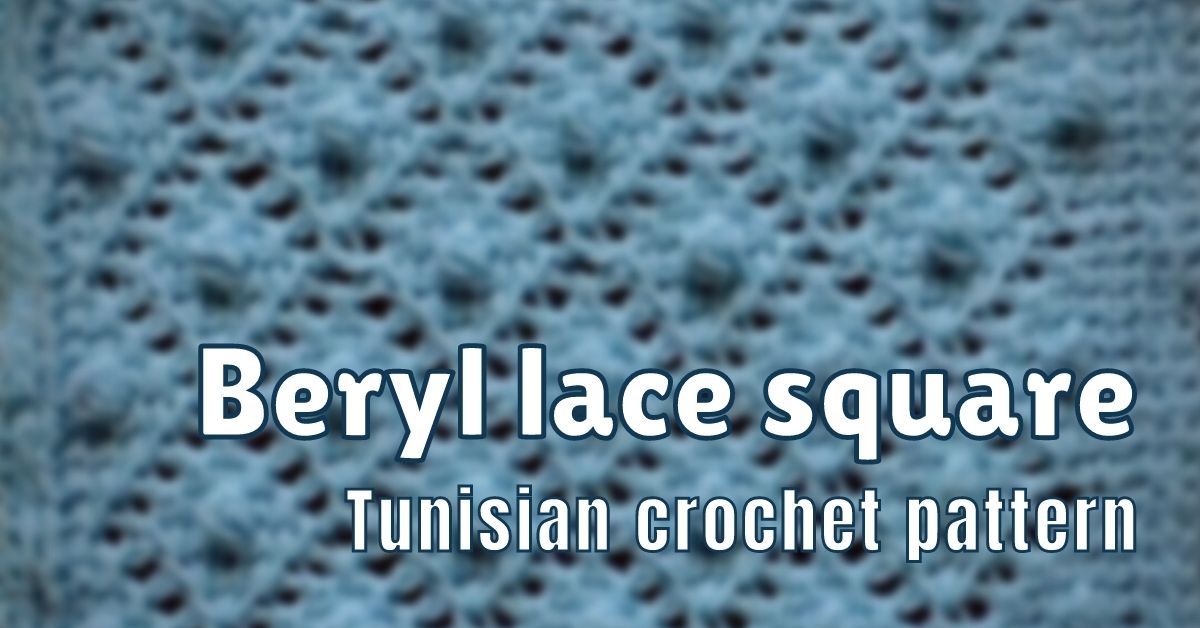
Here are more free Tunisian crochet patterns:
Corner to corner Tunisian crochet scarf pattern
Nordic star Tunisian crochet baby blanket pattern
Tunisian crochet cat ear beanie free pattern
Free wavy mosaic Tunisian crochet pattern
Feather and fan Tunisian crochet pattern for a washcloth
Tunisian crochet asymmetrical rounded triangle shawl tutorial
How to make a Tunisian crochet mosaic bee potholder
Free pattern for leaf lace Tunisian crochet bandana
Tunisian crochet houndstooth pattern for fingerless mittens
Tunisian crochet in the round tutorial with free pattern
If you want to be notified when I publish more patterns and tutorials, make sure you subscribe to my email updates that I send out once a week on Fridays.
Hugs,
Andrea





